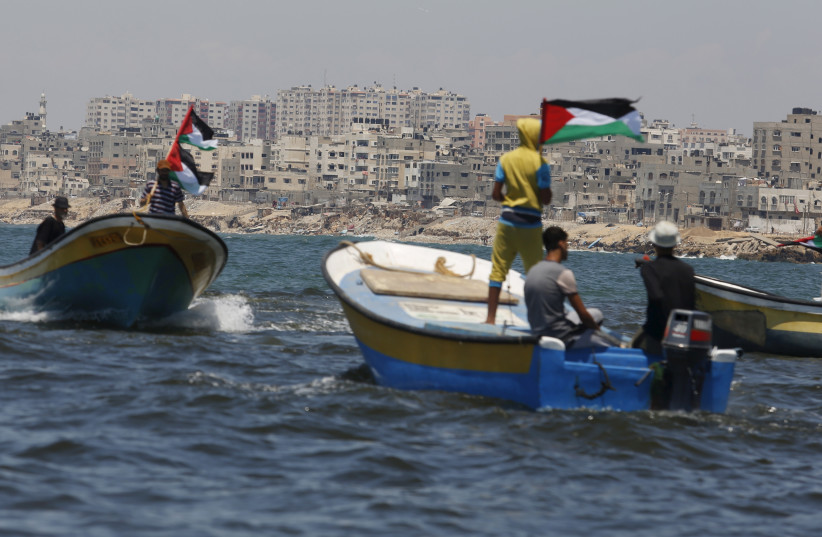On Passover eve, Monday, April 22, a new flotilla carrying so-called peace activists and journalists and 5,500 tons of humanitarian aid is scheduled to set sail from Turkey to the Gaza Strip. Its mission: “To assist the residents of Gaza and to break the Israeli siege.”
On May 31, 2010, almost 14 years ago, the Israel Navy faced violent resistance from armed activists on board the MV Mavi Marmara, resulting in the Gaza flotilla raid in which nine activists were killed and 30 wounded, and 10 Israeli commandos were wounded, one seriously. This time, Israel must be smart and ready for any eventuality.
Who is organizing the initiative?
The initiative is organized by the Freedom Flotilla Coalition (FFC), comprising a dozen NGOs from countries that include the US, Turkey, and South Africa. Its leader is Fehmi Bulent Yildirim, president of the Turkish NGO Humanitarian Relief Foundation (better known as IHH), which was outlawed by Israel in 2008.
Last September, Israel intercepted a shipment from Turkey to Gaza that included 16 tons of ammonium chloride, which can be used to make rocket fuel.
Yildirim said the flotilla includes ships from Turkey, Lebanon, and Libya and aims to reach Rafah after docking at El-Arish in Egypt.

The FFC says it rejects Israeli control of humanitarian aid and will refuse Israeli inspections. It also says, “Our actions against the blockade are always governed by the principles of nonviolence and nonviolent resistance.”
In an opinion piece in The National, a state-owned English-language daily newspaper published in Abu Dhabi, Turkish expert columnist David Lepeska says that the chance of an IHH-led flotilla reaching Gaza peacefully after refusing Israeli inspections is close to zero.
Lepeska notes that with the US military building a pier on the Gazan coast to receive aid ships, the new flotilla would be “a thumb in the eye of Washington and Israel, while thrusting Turkey to the fore after being a minor player during the first six months of the war.”
“A bold maritime aid convoy should be about saving lives,” he writes. “But the indications point to another confrontation at sea, which may have the potential to boost Ankara’s domestic and regional profile, but is unlikely to help the desperate people of Gaza.”
So what should Israel do? This is an opportunity to internationalize the issue of taking responsibility and caring for Gazans. The burden must not fall on Israel alone. As we learned during the Iran attack last weekend, forging a coalition with the US and regional allies can be extremely effective.
Perhaps a clever way can be found to have international inspectors check the food, medicine, and clothing and even allow the aid to reach needy Gazans under the auspices of the US or Egypt, although past experience indicates that this is doubtful.
A harsh warning must be sent via the Turks that the activists cannot carry arms of any kind, and if there is any show of violence, they will be stopped and arrested.
In 2010, the Mavi Marmara incident dealt a severe blow to Israel-Turkish relations, which have become even more strained since the Hamas attack on October 7.
Despite their claims to the contrary, the IHH and its leader are not pacifists. Yildirim’s organization has links with terrorist groups – including al-Qaeda, the Muslim Brotherhood, ISIS, and PIJ.
Fourteen years ago, Yildirim led the flotilla himself and was arrested by the IDF on board the ship and deported back to Turkey.
Several days after the Hamas attack on October 7, in a public address broadcast on the IHH YouTube channel, the firebrand orator called for a blockade of “the fascist, racist, apartheid American regime,” referring to Israel.
Then, according to MEMRI, as a crowd of his supporters chanted “Allahu Akbar” (God is Great), he declared: “Now, let the TV networks broadcast this: My brothers, are you ready for martyrdom? Are you ready for martyrdom? Are you ready for martyrdom?”
The new flotilla could result in catastrophe. With 133 hostages still being held in Gaza as Israel plans a new operation against Hamas in Rafah; war looming on Israel’s northern front with Hezbollah; and the Houthis in Yemen still presenting a threat to Israeli ships in the Mediterranean – as well as the unprecedented recent escalation with Iran – the flotilla threatens to light a powder keg over Passover. That cannot be allowed.
